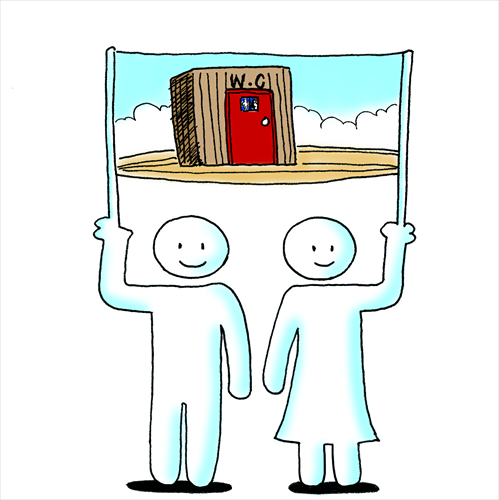Toilet taboo keeps us from discussing real impact of sanitation failures

Illustration: Liu Rui/GT
I once saw a mother let her not-so-young son defecate by the checkouts of a Jingkelong supermarket in Beijing. No one batted an eyelid. Admittedly, this was a few years ago, and these days when we see the strangely frequent reports that a Chinese adult or child has pooped in an inappropriate place, whether it be the aisle of a plane, outside a Gucci store, or a subway train, it's usually played for laughs.
But at least events like this, unsavory as they are, get people talking about toilets, because something that most of us can't live without is still unachievable for billions of people today. For many people in the world, talking about a natural human process is a step too far - talking toilets is taboo.
One man has made it his self-appointed mission to crush the stigma surrounding using the lavatory.
World Toilet Day, which falls annually on November 19, was started in 2001 by Singaporean Jack Sim, the self-styled "Mr. Toilet" of the WTO, the World Toilet Organization. His organization, the first to exclusively concentrate on the issue of toilets, has spawned an annual World Toilet Summit and a Toilet College.
The UN adopted the day last year, but in 2015, 2.4 billion people, one-third of the global population, still do not have adequate sanitation and some 1 billion people still use open defecation in fields, gutters and waterways, according to the World Health Organization.
This puts them at risk of disease, increases child and infant mortality and can spread viruses like Ebola. In sub-Saharan Africa, where 25 percent of people have no access to toilets, people are at increased risk of diseases such as cholera, dysentery, hepatitis A, typhoid, polio and diarrhea. The latter is by far one of the worst killers.
It is the third-biggest killer of children under 5, and studies estimate that a child dies every 2.5 minutes, because of unsafe drinking water, poor sanitation and a lack of hygiene.
Some 842,000 people in low- and middle-income countries die as a result of inadequate water, sanitation and hygiene each year.
And of course, if people defecate in waterways and fields, then disease vectors can enter the food supply chain, resulting in an estimated 10 percent of the global population being forced to eat contaminated food.
Lack of sanitation also leads to stunted growth and disproportionately affects women and girls. Women are at risk of attack and sexual harassment when forced to defecate outside, and many drop out of school as they get older due to embarrassment over menstruation, and the lack of private facilities. This economically impacts families and nations, and lack of education has other knock-on effects, such as increased birth rates.
Ten countries worldwide, five in Africa and five in Asia, account for the majority of countries in which people practice open defecation, accounting for 825 million people. It's a surprise to discover that 10 million Chinese rural dwellers, according to the WHO, have no toilet access - still, it's less than 1 percent of the population. But since 1990, 593 million in China have gained access to improved sanitation.
But India accounts for over half of the global population that still have no toilet access. There, a whopping 47 percent, 597 million people, still defecate in the open. This leads to many health and safety issues, apart from running the gauntlet of snakes and other marauders in dark fields at night.
A shocking spate of highly publicized rape cases focused attention on the lack of toilet provision in rural India.
A WaterAid report in 2012 revealed that nine out of 10 women in India said they faced harassment when going to the toilet, Bloomberg reported last year, after the bodies of two young girls were found raped and hanged near Katra, a village in Uttar Pradesh in northern India.
Indian Prime Minister Narendra Modi made increasing access to sanitation top of his campaign agenda, declaring that India should build "toilets first, temples later." Modi has promised to end open defecation by 2019, an ambitious target, building toilets in schools, villages and public places. The lack of sanitation costs India an estimated $50 billion annually, reported Indian paper The National.
One of the biggest problems, according to Indian media, is that people feel that sharing toilets with others is dirtier than going outside.
This year, the UN set new Sustainable Development Goals to replace the Millennium Goals set in 2000.
The sanitation goal, which was missed, means some 700 million people are still living with poor sanitation.
UN Deputy Secretary-General Jan Eliasson has put forward the aim of ending open defecation by 2025.
If the world wants to achieve this goal, it's surely time to put defecation behind closed doors - but bring the conversation about breaking the toilet taboo into the open.
The author is an editor with the Global Times. opinion@globaltimes.com.cn